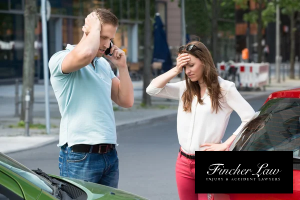
Being involved in a car accident that wasn't your fault can be confusing and stressful. It's important to know what to do next. At Fincher Law Injury & Accident Lawyers, we understand the impact such an event can have on your life. You need to seek medical care for your car accident injuries before trying to call the other driver's insurance company. Let us help you with your car accident claim by dealing with the at-fault driver's insurer. If an accident happened, what should you do next?
Learn more below, and call us to schedule a free case consultation.
Gathering evidence at the scene of the accident is crucial. It can support your claim that the accident was not your fault. Collect as much information as possible by following these steps:
Always call 911 after an accident, even if it seems minor. Request police and emergency medical services if there are injuries. The police will create a report which is vital for your insurance claim. This report often serves as an official record of what happened.
When the police arrive, explain what happened without admitting fault. The at-fault driver will also be given a chance to explain what happened. Be factual and provide any evidence you have. If you need medical attention, don't refuse it. Your health is paramount, and a medical record can be vital later.
Use your smartphone to take photos and videos of the accident scene. Capture different angles of the vehicles, damage, and any relevant road signs or traffic lights. These images can provide a clear understanding of the accident's circumstances. If you have a dashcam, save the footage, as it can be crucial evidence.
Photos and videos can show the vehicles' positions, damage extent, and road conditions. They can help determine who was at fault. If there are skid marks, capture them as well. These visuals are invaluable for insurance claims and potential legal proceedings.
If there are witnesses to the accident, get their names and contact information. Witnesses can provide an objective account of the accident. Their statements can be crucial in proving that you were not at fault.
When speaking with witnesses, be courteous and brief. Ask them to describe what they saw. Their testimonies can support your version of events and be vital in dealing with insurance companies and any legal action.
A police report is an essential document after a car accident. It typically includes the officer's observations, statements from drivers and witnesses, and sometimes an indication of who was at fault. Ensure you get a copy of this report, which can be crucial for your insurance claim.
The report can take a few days to become available. Contact the police department to find out how to obtain a copy. This report will be one of the critical pieces of evidence in your insurance claim and any legal proceedings.
After ensuring everyone's safety and collecting evidence, report the accident to the authorities. If the police didn't come to the scene, you might need to file a report at the nearest police station. This report is essential for legal and insurance purposes.
Report the accident to your own insurance company as soon as possible. Please provide them with all the details and evidence you collected. Be honest and factual in your report. Avoid admitting fault or making assumptions about the accident. The at-fault driver's insurance company will do everything possible to avoid paying your claim.
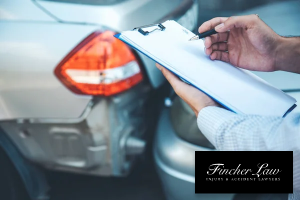
In a no-fault accident, it's essential to understand your rights. Regardless of who caused the crash, your insurance may cover your damages. This includes medical expenses and, in some cases, lost wages. Knowing your policy's coverage is crucial in these situations.
You can sue for additional compensation even in a no-fault state. This is often true of severe injuries or when expenses exceed a certain threshold. Understanding your insurance policy and state laws helps you know what compensation you're entitled to.
Even if you feel okay, you must seek medical attention after a car accident. Some injuries, such as whiplash, might not cause symptoms right away. A doctor can assess any potential injuries resulting from the accident.
Prompt medical evaluation is essential, even for minor injuries. This ensures you receive the necessary treatment and helps document your injuries for insurance purposes. Insurance companies can use a delay in seeking medical care to downplay the severity of your injuries.
Following the doctor's advice and attending all follow-up appointments is essential. These medical records form a crucial part of your insurance claim. They provide evidence of the injuries you sustained in the accident and the treatment required.
Maintain detailed records of all medical treatment about the accident. This includes doctor's visits, medications, physical therapy, and other treatments. Maintain a file with all medical bills and receipts. These documents are vital for insurance claims and any potential legal action.
If you require ongoing treatment, record these appointments and their costs. This documentation helps prove the accident's financial impact on your life. It can be crucial in securing fair compensation for your injuries.
Keep track of all medical expenses resulting from the accident. This includes not only treatment costs but also any out-of-pocket expenses. If you miss work due to your injuries, document your lost wages. These records are essential for calculating the total impact of the accident on your finances.
Documenting lost wages involves keeping a record of the time missed from work, and the amount of income lost. This might include salary, bonuses, and other benefits. This should also be documented if your injuries affect your ability to work long-term. These financial records play a crucial role in your insurance claim.
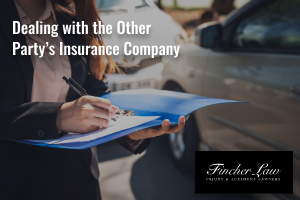
After an accident that wasn't your fault, you might need to deal with the other party's insurance company. It's essential to be cautious in these interactions. Insurance adjusters will try to reduce your claim or get you to admit fault. This can create problems with your own insurance company.
If the other party's insurance company contacts you, be polite but guarded. You are required to wait to provide a statement. It's often best to consult with a lawyer before giving any details. This helps ensure you don't say anything that could jeopardize your claim.
Having a car accident attorney can be invaluable after an accident that wasn't your fault. A lawyer can make sure that you receive fair compensation. They handle negotiations with insurance companies, collect and present evidence, and represent you in legal proceedings if necessary.
An auto accident lawyer is adept at handling complex claims and disputes. If there are disagreements over fault or the extent of damages, a lawyer can effectively argue your position. This expertise is significant in accidents with serious injuries or substantial property damage.
An attorney can negotiate if the at-fault party's insurance company disputes your claim. They understand the tactics insurers use and how to counter them. With a lawyer, you have an advocate who fights for the best possible outcome for your claim.
Insurance providers aim to settle claims quickly and for as little as possible. An auto accident lawyer can protect you from unfair settlement offers. They can assess any offers you receive and advise whether they are reasonable. With their negotiation skills, they can work to increase the settlement amount, ensuring it covers all your damages and losses.
It's essential to consult a lawyer before accepting the first settlement offer. This offer might not fully compensate you for your losses. A lawyer can negotiate a settlement that reflects this. They ensure that you only settle for what you deserve.
A car accident lawyer ensures you receive adequate compensation for all your damages. This can include compensation for medical bills, lost pay, and mental anguish. They understand how to calculate these damages and present a compelling case for total compensation.
If your catastrophic injuries result in long-term impacts, such as ongoing medical treatment or lost earning capacity, a lawyer can include these in your claim. They ensure that all current and future damages are accounted for. With a lawyer, you can be confident that you're seeking the total compensation you're entitled to for all the losses you've suffered due to the accident.
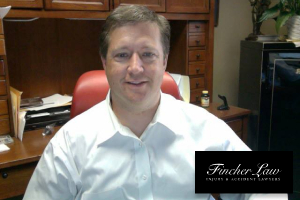
If you've been in a car accident that wasn't your fault, you don't have to face the aftermath alone.Fincher Law Injury & Accident Lawyers is here to provide you with the expert legal assistance you need. We're committed to helping you secure the compensation you deserve.
Contact us today to schedule a free case consultation with our car accident attorney to discuss your personal injury claim.
Schedule Your
Free Consultation
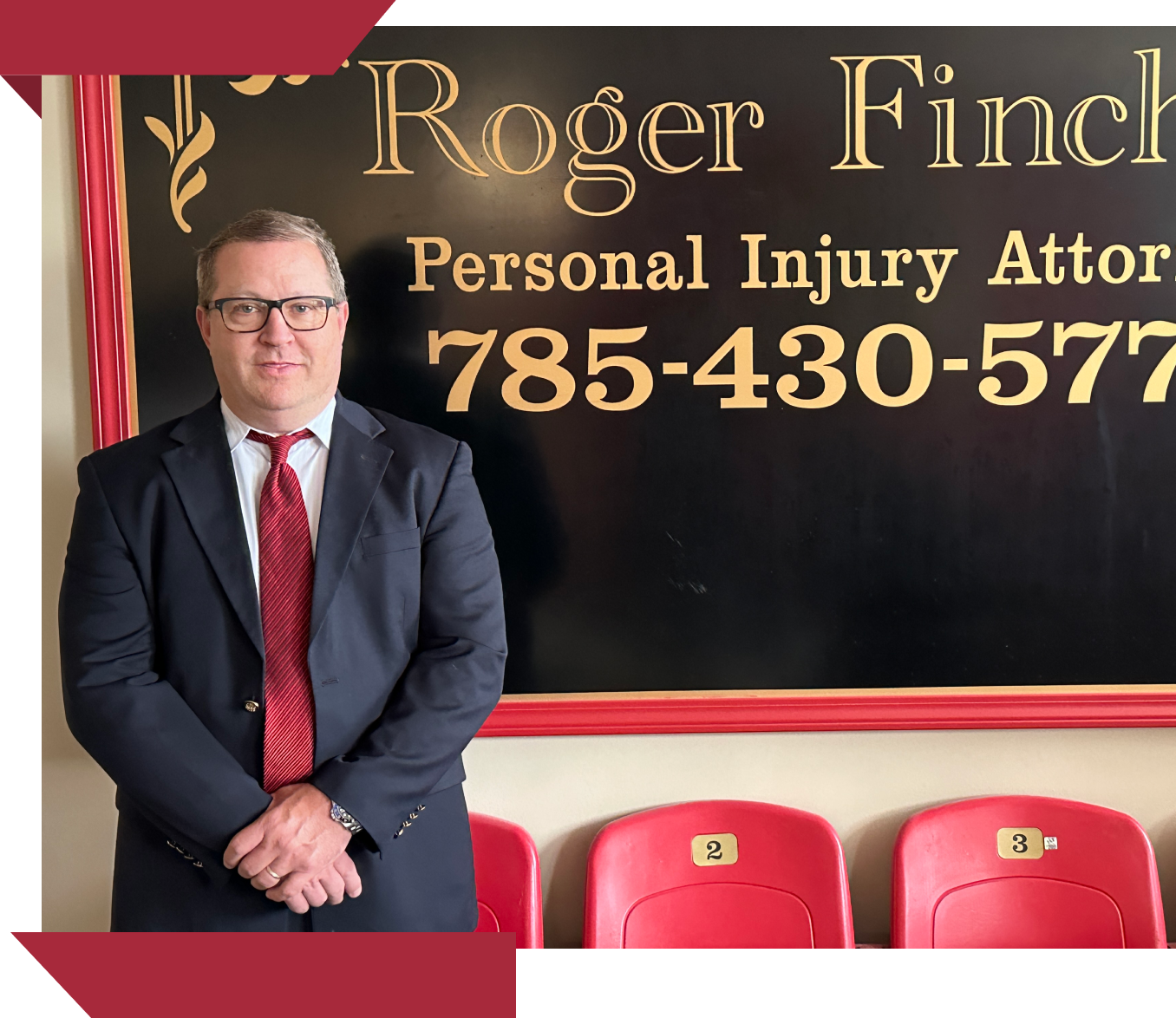
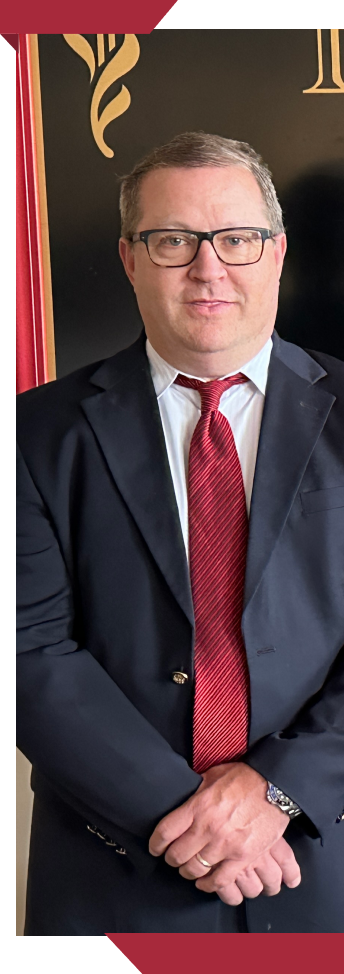

How Can We Help You?
How Can We
Help You?
Schedule a Free Consultation Now By Contacting
Our Team at (785) 430-5770 or by completing the form below
Schedule a Free Consultation Now
By Contacting Our Team
at (785) 430-5770
"*" indicates required fields